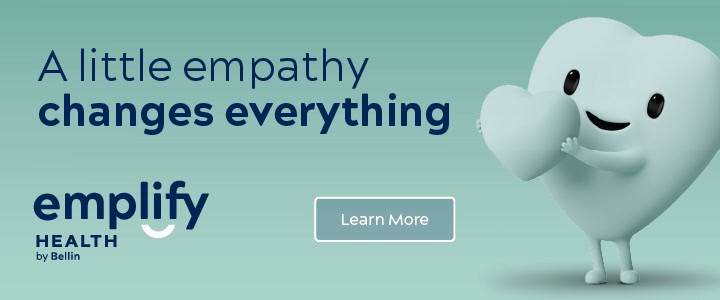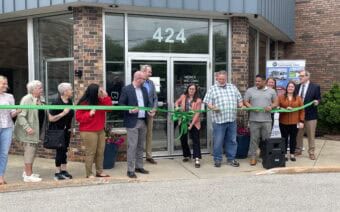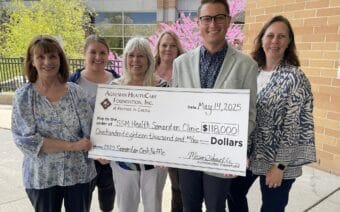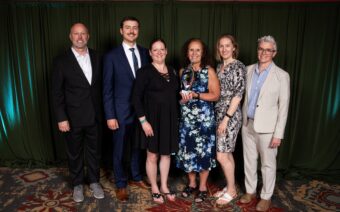
November 28, 2023
NORTHEAST WISCONSIN – According to RAND Hospital Price Transparency Studies, Wisconsin ranks No. 4 nationally for the overall cost of health care.
Anovia Health – an independent physician-led primary care clinic with locations throughout the state – is working hard to change that statistic.
The Northeast Wisconsin-based business – which was co-founded by Sabina Singh (chief medical officer) and Ken Strmiska (chief operating officer) – is a primary care provider that works primarily with companies (but also with individuals) through a monthly membership model.
Through it, Anovia provides what is often referred to as direct primary care at no additional cost beyond the monthly membership fee.
In employer-based scenarios, this monthly fee is typically paid by the employer, and it’s a direct payment with no insurance involved.
The business currently delivers primary care at nine Wisconsin locations in Antigo, Appleton, Clintonville, Green Bay/De Pere, Merrill, Rhinelander, Stevens Point and Weston – with a Marshfield location opening in January.
In the past two and a half years, Anovia Health has grown to have 35 business clients representing more than 8,000 patients.
The impetus for establishing Anovia Health
Over his 30-year career, Strmiska has held several leadership positions in the nonprofit sector, with 25-plus of those in Greater Green Bay.
“In my leadership roles, I saw nonprofits and a lot of small businesses paying the highest cost for health care, and it was getting worse over the years – becoming a community problem,” he said. “If a company or person can’t afford to provide health care, everything else starts to break down in a community.”
Singh, a board-certified family practice physician, has served with Bellin Health locally as well as Kaiser Permanente in Washington D.C. and Raleigh Family Medicine.
Both said they have held roles in, or been advocates for, innovation in a variety of environments.

Ken Strmiska
Singh and Strmiska said Wisconsin has a problem that we’re all paying for.
Strmiska said it’s important to remain competitive and do everything possible to rein in healthcare costs as part of that equation.
“Doing so will free up monies for research and development, employee compensation, other employee benefits and so much more,” he said.
Singh said Anovia Health is also the outgrowth of why she pursued a career in health care to begin with.
During the COVID-19 pandemic, she served on a COVID-response team and Strmiska experienced some changes to his job as well that prompted them to think of what more they could do.
“We were at a good point in our lives to take some risks and did the research,” he said. “(We talked) to one person who (connected us) to another person, and we met the other three people who became our partners and thought, ‘This is the right time.’”
And in May 2021, they incorporated the business.
“Even though COVID was still going, we knew primary care was always going to be needed,” Singh said.
The partners, Strmiska said, opted to open the first clinic in Stevens Point (which opened in August 2021) in Central Wisconsin because it is one of the most costly areas in the state to obtain health care.
Within six months, a location in Wausau was opened, paving the way for a network of clinics.
Openings in Clintonville, Antigo, Appleton and De Pere followed.
In January 2024, a seventh clinic will open in Marshfield.
“It’s been a combination of understanding that primary care is at the front end of the care funnel and the real cost savings that come when people utilize health care more effectively,” Singh said. “That starts with primary care ideally acting as the ‘quarterback’ of care. Primary care can take care of 70-80% of lifetime health-care needs.”
Likewise, Strmiska said a successful scenario also entails a collaborative relationship by a self-insured company, a benefits advisory willing to create the right benefits structure and incentives and then Anovia to quarterback the primary care and independent specialists to whom to refer when necessary.
“We have all three of those things, and we’re increasingly getting more and more independent specialty options…,” he said. “We have to be in sync. There is no silver bullet, but we are a tool for helping to create a better healthcare experience at a better cost.”
How the clinic setting works
A vast number of primary care services are provided in Anovia Health clinic settings managed by a personal physician or APC (nurse practitioner or physician assistant), including health promotion, disease prevention, health maintenance, patient education, diagnosis and treatment of acute and chronic illnesses.
Examples include:
Acute illnesses and diseases such as respiratory illnesses, sprains and bladder infectionsChronic disease management of high blood pressure, diabetes, asthma and high cholesterolCounseling for contraception, smoking cessation or menopause.
The services available at an Anovia clinic, Singh said, are also very accessible.

Sabina Singh
“One of the things that we know has been in trouble in health care for a long time is access to primary care,” she said. “We want to be seen the same day or the next day unless it’s something routine or chronic disease management. (With Anovia), you’re typically seen the same day or the next day.”
Singh said most people are surprised at how intimate the clinic settings are – they tend to be smaller than most traditional healthcare clinics.
“When people first come in, they often say, ‘Oh, this is different,’” she said. “It’s small. The provider is also the receptionist, and we don’t ask a lot at check-in. We get vital signs, the provider comes in and by the time they leave, (patients) say, ‘I really like this. I’ve never spent so much time with a (provider) before, and they thank us. They know we have their best interests at heart and that we will spend the time figuring things out by working together.”
Singh said each clinic provides physical-led, team-based care with nurse practitioners and physician assistants delivering much of the care – involving physicians in care as needed.
“If you have several comorbidities, then the physician is more (hands-on),” she said. “Physicians are the most expensive asset, so we are (mindful) of that. And our staff intentionally gets to know the patient at minimum half-hour visits. We don’t double or triple book patients, and that allows room to work people in because we haven’t maxed out our capacity.”
Singh said so much of the process in a traditional health system, that preface time with a provider – checking in at the front desk, signing papers, showing your card, answering 100 questions – is mandated by insurance.
“It’s not that we shouldn’t get that information, but wouldn’t it be more appropriate for the patient to share it at the right time,” she said. “We’ve been able to look at certain things in the system that have led to inefficiencies and say, ‘Let’s not do that.’”
Access extends to direct provider access as well.
Strmiska said when the clinics are closed, the physicians are on call and available to respond to phone calls, texts, emails, etc. – with most on-call outreach occurring on the weekends.
“We get that life happens, and it’s often patients asking whether they need to go to the hospital or emergency room right away,” he said.
Strmiska said there is comfort in knowing a physician is always accessible, and so far, members have been very respectful of that level of access.
Personalized care
Strmiska said Anovia’s model goes back to market fundamentals.
“When people are dissatisfied, there is an opportunity,” he said. “We need great hospitals and specialty care, absolutely. But the system has been so complex… We try to help people make wise decisions and know their options.”
That means knowing what specialty care options will cost and even addressing some of the pros and cons of each.
For example, Strmiska said, some employers not only have the direct primary care model with Anovia but also have preferred providers for surgeries, for example.
“It’s really up to the company strategy for care beyond us, and there’s always an option of choice,” he said. “But the (scenario) may include staying in the local market for a knee replacement with normal copays, deductibles, etc. (through their health insurance). Or, they may have a direct contract with (an independent) surgery center at a discounted cost or even free. It all depends on the companies as they are self-insured. But ultimately, it’s the patient who makes the decision. The companies are helping them spend less on health care while getting great outcomes.”
In other instances, Strmiksa said some employers have what’s considered a “second opinion” service to help the employee walk through the options presented, again with the patient ultimately making the final decision.
Like-minded partnerships
Strmiska said when he was knocking on the doors of businesses in Central Wisconsin during the first year and a half of business, he also pursued partnerships with brokers/benefits advisors – recognizing their importance.
“A lot of companies look to their advice on what to do,” he said.
Fortunately, Strmiska said, Anovia is partnered with innovative and creative benefits advisors willing to be “disruptors” in the health insurance and health benefits space.
Case study: AmeriLux Family of Companies
The AmeriLux Family of Companies, headquartered in De Pere – which includes AmeriLux International, AmeriLux Transportation, AmeriLux Logistics and Shape Products – began working with Anovia for its local employees in January through their benefit consultant, Avergent.

The AmeriLux Family of Companies – which includes AmeriLux International, AmeriLux Transportation, AmeriLux Logistics and Shape Products – began working with Anovia in January. Submitted Photo
“We want to provide the best healthcare services to our team at the best possible price point,” Saige Diedrich, human resources manager at AmeriLux Family of Companies, said. “We wanted to better control our destiny and working with Anovia was a (key) way to do that.”
Diedrich said AmeriLux employees receive quality primary care with minimal wait times and at no cost to them or their dependents.
“The staff has gone above and beyond to accommodate our team members through the entire course of their care,” she said. “We get feedback that the staff cares about our employees, taking the time to figure out what’s going on and the best course of treatment, and treating people as people and not numbers which is unique to the healthcare industry right now.”
Diedrich said employees not on the company’s health plan may visit the Anovia clinic six times per year – those on the plan have access to unlimited visits, all at no cost to the employee.
The offering, Diedrich said, complements another outgrowth of the companies’ work with Avergent last year, with the introduction of a $0 deductible, copay-only health plan – something she said is becoming a differentiator in AmeriLux’s benefits package.
“For anyone who has had healthcare issues, this is a really big selling point, and from a retention standpoint, we have employees who haven’t had catastrophic health issues starting to appreciate the clinic for things that are so common, such as a sinus infection,” she said. “Our benefits package in total has been elevated in the past two years and part of that is the partnerships with Avergent and Anovia. We are striving to do things differently because we put our culture and team members above anything else.”

Saige Diedrich
The successful partnership with Anovia, Diedrich said, has prompted AmeriLux to approach the clinic about potentially opening a location for their associates in the Menomonie market.
What’s next for Anovia
Strmiska said Anovia isn’t the only one in Wisconsin pursuing the direct primary care model – but that’s a good thing.
“Others are seeing our success and starting it, and that’s good as we need more independent care,” he said. “The environment is becoming much more friendly as more (people) become familiar with the concept and promise of independent primary care.”
Furthermore, Singh said they knew when they started Anovia that they would need to expand to become a network of clinics to attract physicians from traditional healthcare systems.
“We will grow and would like to be across the State of Wisconsin and have been asked to move into the Twin Cities as well,” she said. “Employers are appreciating the relationship with us and how they can get a hold of us, have us come out regularly and ask questions.”
Singh and Strmiska said they are heartened by the increasing number of companies opting to pursue direct primary care through entities such as Anovia.
“Companies doing this care about their employees, not only their physical health but their financial health,” Strmiska said. “It’s easy to talk about the (monetary) impact the company can have. But it’s truly about them caring about what’s happening to their employees and their families. Health care is a huge stressor, and if they can take that stressor away, they will have happier employees.”
 ‘I am incredibly grateful to be a small part of the team’
‘I am incredibly grateful to be a small part of the team’ CEO of Menomonie chamber selected for U.S. Chamber Fellowship
CEO of Menomonie chamber selected for U.S. Chamber Fellowship







